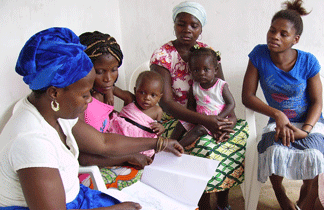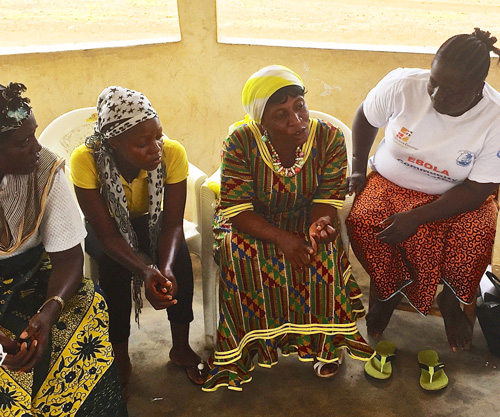Equality & Violence Against Women and Girls

Women’s equality, women’s empowerment and violence against women and girls prevention and response are cross-cutting themes that shape and inform all of Episcopal Relief & Development’s integrated programs worldwide. In order to sustainably and equitably address hunger, poverty, disease and post-disaster relief and recovery, local attitudes and customs around women, power and violence against women and girls must also be taken into account.
“Unless women fully enjoy their human rights, to which freedom from violence is inextricably bound, progress toward development will continue to fall short.” USAID
Women’s and men’s roles and other social norms impact every area of Episcopal Relief & Development’s work, and addressing violence against women and girls is a major area of focus. Violence against women and girls affects the health and well-being of women in every country, regardless of socioeconomic or ‘development’ status, and almost all of our partners identify violence against women and girls as a major obstacle to healthy and prosperous families and communities. There is a great need for the voice and action of faith leaders, communities and institutions to prevent and respond to violence against women and girls, and to restore the health, dignity and livelihoods of women and girls affected by violence.
Although violence against women and girls is often associated with countries experiencing conflict, it is present everywhere, in various forms such as domestic violence, rape and the marginalization of girls and women across cultures and nations. Stemming from attitudes and practices around women and power that are deeply ingrained in society and culture, violence against women and girls is a sensitive issue and often falls by the wayside of community dialogues and interventions. Change must come from within those communities to be lasting and effective, and faith leaders have a unique position of trust and influence at both the individual and community levels to enable and encourage such change. Our programs aim to empower these leaders and to leverage their roles in their communities to become champions for the support, protection and empowerment of survivors of violence, and of women and girls in general.
Two of Episcopal Relief & Development’s violence against women and girls prevention and response projects are:
 |
Preventing and Responding to Sexual Violence and Violence Against Women and Girls in Liberia: With support from the UN Trust Fund to End Violence against Women and Girls and Islamic Relief USA, we and our partner, Episcopal Church of Liberia Relief and Development, are implementing an innovative program in Liberia to engage Christian and Muslim leaders and institutions, such as the Inter-Religious Council of Liberia, in violence against women and girls prevention and awareness. In Liberia, the root causes of violence against women and girls are embedded in family and community dynamics that were eroded during 14 years of civil conflict and have yet to recover. |
Facts on Violence Against Women and Girls Worldwide:
- Worldwide, one in five women will become a victim of rape or attempted rape in her lifetime; as many as one in three are beaten, coerced into sex or otherwise abused in their lifetimes.
- Based on data collected from 24,000 women in ten countries, between 55 and 95% of women who have been physically abused by their partners have never contacted the police, shelters or NGOs for help.
- Violence kills and disables as many women between the ages of 15 and 44 as cancer. And its toll on women’s health surpasses that of traffic accidents and malaria combined.
- Survivors of sexual assault are 3 times more likely to suffer from depression, 6 times more likely to suffer from post-traumatic stress disorder, 13 times more likely to abuse alcohol, 26 times more likely to abuse drugs and 4 times more likely to contemplate suicide.
- An estimated 100 to 140 million girls and women worldwide are survivors of female genital mutilation (FGM).
- It is estimated that close to 90% of current war casualties are civilians, the majority of whom are women and children, compared to a century ago when 90% of those who lost their lives were military personnel.
Episcopal Relief & Development recognizes that this global epidemic impedes the transformation of just societies, erodes the human assets and strengths of a community, causes severe health problems for women and children and stunts health economic activity.
Our current strategic plan focuses on supporting our church partners to strengthen and improve their efforts by:
|
Prevention |
|
|
Provision of Services for Survivors |
|
|
Prosecution of Perpetrators |
|
|
Policy |
|



